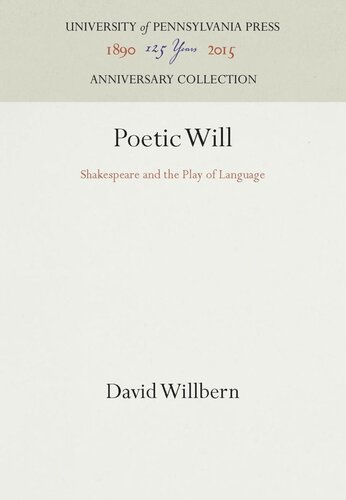

Most ebook files are in PDF format, so you can easily read them using various software such as Foxit Reader or directly on the Google Chrome browser.
Some ebook files are released by publishers in other formats such as .awz, .mobi, .epub, .fb2, etc. You may need to install specific software to read these formats on mobile/PC, such as Calibre.
Please read the tutorial at this link. https://ebooknice.com/page/post?id=faq
We offer FREE conversion to the popular formats you request; however, this may take some time. Therefore, right after payment, please email us, and we will try to provide the service as quickly as possible.
For some exceptional file formats or broken links (if any), please refrain from opening any disputes. Instead, email us first, and we will try to assist within a maximum of 6 hours.
EbookNice Team

Status:
Available4.6
12 reviews
ISBN 10: 0812233891
ISBN 13: 9781512809374
Author: David Willbern
The essence of Shakespeare, observes David Willbern, is in the details. What matters most in our appreciation of Hamlet is not the staged play but the play of language we find in the words of the Bard.
This book explores the expressions of Shakespeare's poetic will—his sexual desire, conscious and unconscious volition, and posthumous legacy—within the linguistic matrix that enfolds his characters and readers. Using a combination of psychoanalytic approaches, Willbern rescues Shakespeare from the limitations and distortions of dramatic performance by showing that his language, scenes, and characters are propelled by the genius of this will and need to be understood primarily as written narrative.
In these provocative essays, Willbern examines the deep analogy between poetic creativity and sexual procreation as he explores the parallels between Shakespearean and Freudian representations of fantasy, thus offering readers a heightened awareness of the sexual and bodily substrate of Shakespeare's language. Engaging current debars between psychological and social approaches, he develops new strategies of reading in a search for the limits of Shakespeare's language and our responses to it. He then applies these strategies to all of Shakespeare's genres via detailed analysis of a comedy (Twelfth Night) a history (Henry IV, Part One) a tragedy (MacBeth) and a poem (Lucrece). Additional essays provide an overview of Shakespeare both as a creative agent and as a body of work. Questions of identity, authenticity, and representation-especially as posed in Hamlet—are a recurrent concern throughout the book.
Poetic Will frees the play of language in Shakespeare from its illusory anchors in characters and resituates the experience of reading his work within individual response and reconstruction. Offering practical criticism with a bold, American slant, it emphasizes the rich potential of Shakespeare's poetic language while exploring the interpretive and rhetorical limits of psychoanalytic literary criticism.
1. Limitations of Character, Limits of Language
2. Paranoia, Criticism, and Malvolio
3. Pushing the Envelope: Supersonic Criticism
4. The Famous Analyses of Henry the Fourth
5 Hyperbolic Desire: Shakespeare's Lucrece
6 Phantasmagoric Macbeth
7 Shakespeare's Nothing
8 What Is Shakespeare?
poetic language in the prologue of romeo and juliet
how did shakespeare use language in his poems and plays
language shakespeare used in his plays
a play within a play shakespeare
the language of shakespeare worksheet + answers
Tags: David Willbern, Poetic Will, Shakespeare, Language